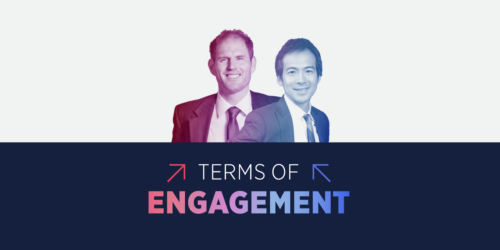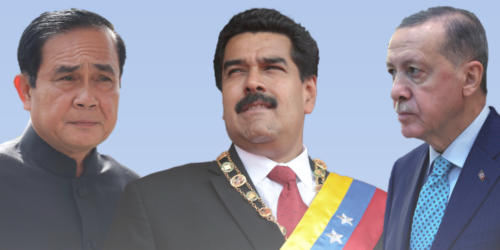Around the world, democratically elected leaders are subverting the very institutions that brought them to power, gradually eroding checks and balances to undermine democratic norms. During what many are calling a constitutional crisis in the United States, a recent panel explored global patterns of democratic backsliding, drawing on firsthand experience from Venezuela, Thailand, and the United States. Moderated by Archon Fung, director of the Ash Center for Democratic Governance and Innovation, the discussion featured Freddy Guevara, cofounder of the Venezuelan progressive party Voluntad Popular; Pita Limjaroenrat, a Thai politician and chief adviser to Thailand’s Move Forward Party; and Daniel Ziblatt, director of the Center for European Studies and author of How Democracies Die.
The Moment Things Changed
Fung opened by asking the panelists about key turning points in their experiences with democratic decline. Guevara, a visiting fellow at the Ash Center, asserted that backsliding is a process, not a single moment. “You don’t realize you’re in a period of democratic backsliding until it’s too late,” he said. Even though Hugo Chávez was democratically elected, he exploited that power to erode democratic institutions—silencing opponents, capturing the judiciary, and shutting down independent media. “That was when we were in deep trouble … I could feel the state entering into my home,” he said.
For Limjaroenrat, a senior research fellow at the Rajawali Foundation Institute for Asia at Harvard Kennedy School, the process in Thailand was similarly methodical, with democracy being dismantled in four stages: first, rewriting the constitution; second, dismantling the opposition; third, weakening institutions; and fourth, suppressing voters. Then, he explained, “you have autocracies that hold elections occasionally, but if the result is not as they want it, they can always change the outcome.”
Fung then turned to Ziblatt, Eaton Professor of the Science of Government at Harvard University, noting that he was “an early person to raise the alarm bell” about President Donald Trump’s authoritarian tendencies. In 2016, Ziblatt co-wrote an op-ed warning that Trump’s refusal to commit to accepting the election results was a dangerous sign. “That was the soft first alarm bell. Lots of people, I think, slept through that,” he said. The January 6th attack and subsequent pardoning of rioters, he added, reinforced two “cardinal rules of democracy: You have to accept election results, win or lose, and you can’t engage in violence or threaten violence to hold onto power.”
Patterns of Democratic Erosion
Despite differences in their individual experiences, the panelists agreed on common patterns of backsliding, starting with deep polarization. “It’s a symptom of a deeper problem …” said Guevara. “People don’t vote for populists or authoritarians just by mistake—it can [end up] being a mistake, but there are reasons behind that.” Limjaroenrat pointed out that Thailand’s parliamentary system had failed to address conservative voters’ concerns, fueling division.
Ziblatt cautioned against conflating voting for change with voting for authoritarianism. “There are all sorts of reasons people vote an incumbent out of office … in some ways, we got these threats to democracy on accident,” he said. He then outlined three key steps in democratic erosion: capturing neutral institutions meant to check power, dismantling checks and balances through executive overreach, and silencing the opposition, including the press. Freezing funding to USAID, for example, may be a “a perfectly legitimate policy decision,” he said. “But usually you’d send out an audit, decide there’s some monkey business going on, and propose to Congress that they pass a law because they have the power of the purse. Instead, the executive branch is acting outside the constitutional process.”
Resources for a More Resilient Democracy
So, how can we make democracy more resilient to safeguard it against authoritarianism? Fung referenced democratic moats— layers of institutional and societal protections that reinforce one another. In the United States, he identified five: democratic norms, opposition leaders, courts, civil society, and elections. “Which moats are priorities for building up?” he asked the panelists.
Limjaroenrat stressed voter turnout as the best defense. “Voter mobilization and engagement strategies … are two things that can respond to the present system. We need 70% or more going forward,” he said. Guevara agreed but warned that turnout alone isn’t enough. “You can have the most transparent electoral system, but if you don’t win the hearts and minds of the people, it doesn’t matter.” Ziblatt then emphasized that these protections must work together: “The moats are mutually reinforcing; they’re not separate strategies.” He cautioned against complacency, noting that when institutions assume the other will act, democratic erosion accelerates. Finally, all three panelists agreed that independent media must be protected as long as possible, as it remains one of the strongest defenses against disinformation and democratic decline.
Fear and Courage
The conversation ended on a personal note, with the panelists reflecting on the costs of resisting democratic backsliding. “This is early days compared to Thailand and Venezuela,” Fung noted, turning to Guevara and Limjaroenrat. “You both have experienced direct state repression in serious and personally costly ways.”
Guevara urged people to take the threat seriously but also to recognize the opportunities they still have to resist. “In these struggles, it is very difficult to underestimate or overreact,” he said. For Limjaroenrat, the struggle is ongoing. “What keeps me awake at night is that they’re not done with me yet,” he said, noting that the government is working to turn his 10-year political ban into a lifetime prohibition. Still, he remains hopeful. “What keeps me going is the youth—the younger generations.”




